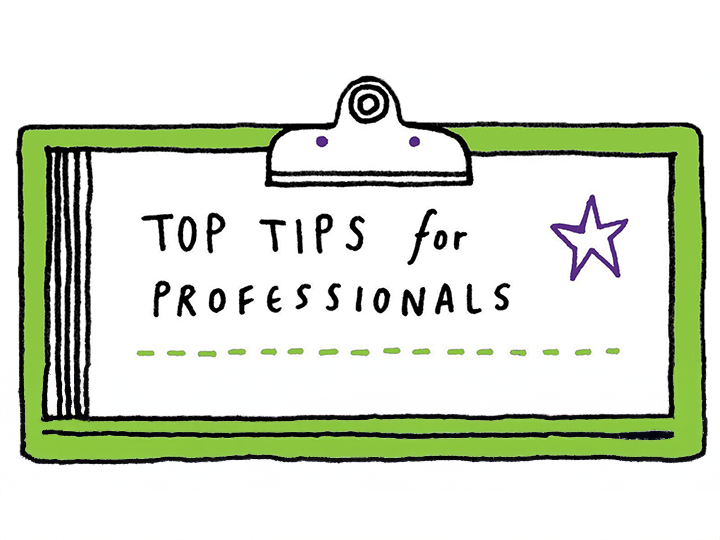Neurodiversity best practice guide for professionals
- SEND
- Professionals and Clinicians
- Neurodiversity

Find a list of ways for GPs and health professionals to help neurodivergent children and young people. Created alongside neurodivergent children and young people.
Explore the topics on this page:
How to communicate with me
- If we’ve not met before, introduce yourself and take time to listen to what both me and my mum have to say.
- Explain to me what is happening and why.
- Talk to me and listen. Listen to me and learn from me.
- Look at me when you are talking.
- Use words that I understand at a slow pace so I can process the information.
- Be happy and friendly, be positive.
- Talk to me nicely. It depends on who you are if I’d like to be talked to. Please say hello to me and use my name.
- Ask me about how I’m feeling about the situation.
- I would like a braille copy.
- Don’t nag.
- Be accessible through email and phone
- Saying goodbye when leaving, we would like a chance to say thank you.
How to best support me
- I need information to make proper choices about the things that involve me.
- It helps having someone I know really well to go with me to support at meetings.
- Reassure me.
- Give me some ideas of things I can do outside of school to help me be more sociable like sports and youth groups.
- Give me something to take away- advice or something to practise/ work before the next session.
- Help my family to help me.
- I would like to have a copy of what is in place to help me.
- If people are there to help me I would like them to leave me alone and know that if I have a problem I will ask them about it and for help.
- I liked to be independent and don’t want ‘help’ all the time.
How to be prepared
- Provide information about appointments in advance …. I like knowing what’s going to happen, where I am going and who I am seeing. Video’s and pictures are best.
- Be reliable and on time.
- Think about the space I need before I arrive! …Make space for my wheelchair. It feels awkward to wait while you move the room around. Sometimes my wheelchair blocks gangways and I keep getting asked to move - sometimes I end up facing walls/corners. I feel like I’m in the way.
- Please read about me before the appointment. It means the meeting won’t have to be so long and I don’t have to repeat myself.
- We don't like the phrase “What’s the problem?”, especially when you’ve asked to see me.
- Be flexible around appointment times where coming a long distance …If we have to travel long distances to appointments, try not to book us really early, please don’t tell us off if we’re late. Some things can make journeys take longer, and there can be problems along the way (e.g. broken lifts, not finding accessible bathrooms, seizures, etc.)
How to make me feel comfortable
- Wherever possible hold the meeting somewhere I’m familiar with and feel comfortable…. meetings at school are nice. It feels safe and comfortable, but it’s good to know in advance you’re coming. At school we can meet in bigger areas.
- My house is my safe place and so it is better if I can go to other places for help.
- Have things in the waiting room for whole range for children, not just the little ones.
- Have things in the room to help me feel comfortable to be there.
- Think about where I can sit and if there are things for me to do for the bits I’m not involved in while you talk to my mum.
- Make sure that I have a quiet place to talk to you.
- I would like to be part of the conversations but I worry about what might be said.
- Be happy, smile and be honest. Positive attitude, trustworthy, non-judgemental.
- By wearing the badge in public is attracts people and sends ‘some flashing lights’ – don’t wear the badge.
How to hear my voice
- Hear our voices.
- I want to share my ideas.Give us more opportunities to share our opinions.
- It would be nice to be asked what we want and for our choices to be followed through.
- I think they should listen to me, so I feel important and valued.
- I like it when adults ask if they have understood.
- Be patient and wait for me to feel ready to answer a question.
- Professionals should understand we may be shy but we still want to be spoken to even if we don’t want to talk back.
- Treat me how you want others to treat you.
Downloads
-
Best Practice Guide For Health Professionals Working With Neurodivergent Children And Young People
895.09Kb
Uploaded 19/08/2024
Last reviewed: 27 November, 2024



